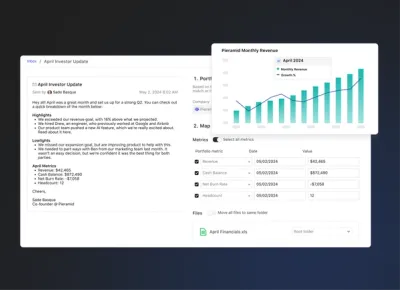
The way that a company manages relationships with its investors says a lot about the professionalism of its management team and its likelihood of sustainable success.
A recent (unscientific) survey we conducted among dozens of early stage VCs showed that investors are 2 times more likely to make follow on investments in companies who have provided regular investor updates.
While some of that is explained by our desire as humans to only share information that paints us in a positive light – meaning that only companies doing well would want to tell their investors – it is clear that the highest performing companies care about building mutually beneficial relationships with their key stakeholders.
Regular investor updates are key in keeping your backers involved in your business so that they can provide input and assistance in their respective areas of expertise. They are also a sign of an active and engaged entrepreneur who values what her stakeholders bring to the table. Perhaps most importantly, consistent investor updates help stop inbound and asynchronous requests and give you time back (135 hours per year according to another survey we conducted) to focus on building your company.
So when is it most important to be sending investor updates?
1. You are having trouble hiring the best people for your company
You are not alone, hiring is hard! In a recent First Round survey – called The State of Startups – the #1 concern among founders was the ability to hire good people.
For early stage companies, where trust is a crucial component in the hiring process, leveraging personal networks is often one of the best ways to bring on the best people. Because of their involvement with so many companies, investors often play the role of super connecters in the early stage tech market and can have a major impact on your ability to find the right fit for your open roles.
This connectedness helps partially explain the rise of the “Venture Community” or “Venture as a Platform” model made popular by firms like a16z and First Round. When successfully applied, this model tends to create a virtuous cycle and turns out to be very good for business…both yours and your investors’.
- Investors help people in their network find good jobs which bolsters their reputation.
- Their companies (that’s you!) fill the roles they need and can accelerate their product and business progress.
- Those companies have more success and generate better returns for the investor.
Investors are willing and often able to help your company find the right people to support your growth. All you need to do is ask!
2. Your circle of feedback is getting smaller and smaller
One of the most important things that you can do as a founder, product person, or business leader is stress-test your ideas with the smartest people you can find. To pull an example from outside the tech world, Bridgewater’s Ray Dalio – the most successful hedge fund manager of all time – seeks to find the right answers by seeing whether his ideas stand up to scrutiny from the brightest people in his network.
“I stress-tested my opinions by having the smartest people I could find challenge them so I could find out where I was wrong. I never cared much about others’ conclusions—only for the reasoning that led to these conclusions. That reasoning had to make sense to me. Through this process, I improved my chances of being right, and I learned a lot from a lot of great people.”
– Ray Dalio, Principles
It can be easy to fall into a pattern of running things by the same people every time you need to make a decision and in some ways, it is important to have people you can consistently call on for input. But exposing your ideas to a wider range of people – something your investors can help provide, either through their own feedback or intros to people in their network – can help unlock insights that wouldn’t have been possible with the same small circle you always rely on.
3. Things have been quiet on the press and promotion front
When investors don’t hear anything about your business for extended periods of time, they tend to check out.
With startups, no news = bad news: Why investor updates are really, really important http://t.co/bywRt6mf85 @jason via @nuzzel
— Andy Smith (@kabbenbock) February 10, 2015
For the most part, early stage investors have their priorities pulled in a number of different directions. Maybe they are angels who also have their own company to run or they are at a VC firm with a dozen other investments and another fund that they themselves need to go out and raise. Don’t make it any harder than it already is to stay on their radar. When you and your team are heads down building your product and don’t have the resources to trumpet your progress to the press, you may go months without any major announcements or releases. Filling these information gaps with quality investor updates are the only way you can make sure your backers stay engaged.
4. You need to raise more money
As the proverb goes, the best time to send an investor update (or plant a tree) was when they first wired the cash. The next best time is today. However, when you are down to a month of runway and haven’t checked in with your investors in a while, it might be too late…
If u haven’t sent an investor update in > 3 months … no need to reach out now. I’ve already checked out. — Jason M. Lemkin (@jasonlk) December 16, 2015
So make sure you get started before you hit the point of desperation. Good companies have insight into when and how they will need to finance the business in the future. If you have a good handle on how much runway you have left, you can be proactive in setting yourself up – by asking your investors for intros to later stage VCs, for example – to raise your next round successfully.
5. You just raised a round
Your relationship with investors is very similar to the type of courtship you go thorough with potential customers. You target the right people, nurture your relationship over time with timely updates your progress, and eventually bring them onto your cap table and into your business. It doesn’t stop there, however. Once you’ve brought investors on board, your goal should be to convert them from “customer” to “evangelist”.
A customer pays your business money. An evangelist pays your business money and helps you make even more money by speaking and acting positively on your behalf. Similarly, investors take an ownership stake in your company while evangelist investors have a sense of ownership that stretches beyond what shows up on the cap table.
Building evangelism helps take care of the four previous points in this article. When you are able to convert someone from investor to evangelist, that person will be willing to anything they can – from hiring and finding customers, to providing feedback and facilitating introductions to future investors – to support the long-term success of your business.




